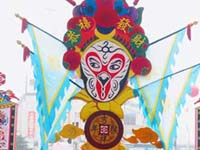
With Chinese Spring Festival drawing near, people can see logos or signs of monkeys appearing here and there on the streets.
According to Chinese astrology (with years corresponding to one of 12 different animals), the coming year will be the Year of the Monkey.
The Han Nationality commonly thinks of the monkey as a lucky and smart animal. When Chinese describe a person as "a monkey", it means the person is extremely sly or cunning.
The pronunciation of monkey "hou" in Chinese is the same as that for "high official", so that in ancient times those who hoped to be promoted usually liked the animal.
It often appeared in paintings, such as a monkey sitting in a maple tree, a monkey riding on a horse, or one monkey standing on the shoulder of another. All these represented the expectation of promotion to a higher official positions.
Monkey King
Fondness for the monkey among Chinese may also originate from the popularity of the novel "The Monkey King", one of the four greatest literary works in Chinese history, written by Wu Cheng'en during the Ming Dynasty (1368-1644).
In that fairy tale, set during the Tang Dynasty (618-907), the humanized monkey Sun Wukong, together with two other accursed spirits, accompanied an honored monk to the West in search of the Buddha Sakyamuni.
On their long and sacred journey, lasting many years, they confronted a total of 81 devils and dangers. Sun had magic abilities which allowed him to conquer all of them. This monkey has thus earned the place of a legendary almighty hero in every Chinese mind.
There is even a set of Chinese kungfu "hou quan," imitating the monkeys' gestures and postures in attacking enemies.
However, there was also a famous Chinese culinary delight - eating the brains of live monkeys, which has become very rare in the country these days.
This was a cruel feast - with the monkey fastened by its head which the chefs broke open while the unfortunate creature was still alive. The chefs would then sprinkled some soup or oil onto it, making what was said to be a supremely delicious dish. It has now been banned by the government to protect wild animals, and most Chinese can no longer bear the thought of this type of meal.
Animal mystery
People with folk beliefs do not seem to like the year of monkey, which - along with the year of the dog - is traditionally linked to disasters and bad harvests.
Another bad year is that of the Ram (or Sheep), such as 2003. Many mothers did not want to bear children, especially girls, last year because Ram children were seen as destined to lead miserable lives.
At the other extreme, a particularly good year is that of the Pig.
No accurate record can be found of when the Chinese calendar of animals began to be applied. The earliest description of it occurs in a book written during the Eastern Han Dynasty (25-220). It seems that the birth of the years of animals was related to people's understanding of astronomy.
The figure of 12 was considered to be a providential number. Before people knew a way of measuring a year, they noticed that 12 cycles of the moon's waxing and waning accounted (very roughly) for a year.
A day was divided into 12 "shichen" (one "shichen" equals two hours).
Starting from the early morning, every "shichen" was represented by one animal. During each period of two hours the allotted animal was considered to be most active.
The very first two hours (12:00am to 2:00am) was for mice, which came out to find food, followed by cattle that began to work in the fields before dawn, and then tigers and so on. Monkeys were active from 4:00pm to 6:00pm. Of the animals, only the dragon was imaginary.
These 12 animals were used to represent years in turn, starting with the mouse and ending with the pig.
A lot of stories have been told about how the 12 animals were selected. However, these only took form over a long period of time, as traditional folk tales were shaped by generations of Chinese.
In China and for Chinese abroad, the 12 years form one "ji" or "lun" (a complete cycle of time).
(Shanghai Daily January 13, 2004)
|

